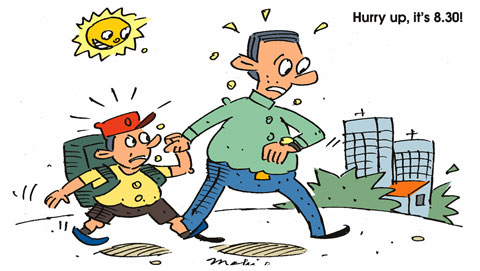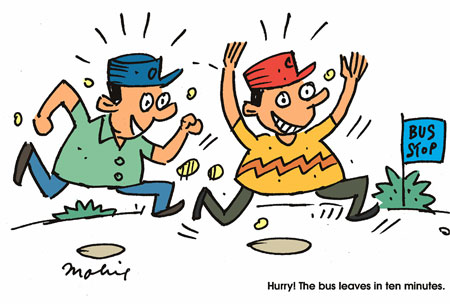|

by R. S. Karunaratne
Key verbs
Be
'Be' is an irregular auxiliary (helping) verb and it is also a
linking verb.

Am: First person singular present tense
I am a journalist.
Are: Second person singular and plural present tense
You are a student.
You are students.
Is: Third person singular present tense
Wimala is a pious Buddhist.
Was: First and third person singular past tense.
I was present at the meeting.
Gemunu was a great king.
Were: Second person singular and plural past tense
You were running to school.
You were in the class when I walked in.
Being: Present participle
The house is being built. ( Passive Voice)
Been: Past participle
Wimal has been an editor for ten years.
In spoken English, the present simple tense forms of 'be' are often
contracted.
I'm going home.
You're going to school.
He's going to Kalutara.
We're going to Sri Pada.
You're going to Belihuloya.
They're going to London.
How to make negatives
We make a negative with 'be' by adding 'not' immediately after it.
Present tense: I'm not late.
You're not late.
You aren't late.
He isn't late.
He's not late.
We aren't late.
We're not late.
They aren't late.
They're not late.
Past tense: I wasn't late.
You weren't late.
He wasn't late.
We weren't late.
They weren't late.
Use of 'be' as an auxiliary verb
We use 'be' as an auxiliary verb to form the past and present continuous
tense and the passive voice.

The corrupt officer is taking bribes from every bus driver. (Present
continuous)
Prem was driving to work when the accident happened. (Past continuous)
The dog was driven away by its owner. (Passive voice)
We use a 'be' verb with an infinitive to show that something is
planned to happen.
The talks between the university teachers and the minister are to begin
next week.
The minister is to visit Egypt in January.
We use a 'be' verb to introduce more information or give an opinion
about a subject.
Ms Anula is my music teacher. (Information)
Kumaran is a busy executive. (Opinion)
We use 'be' with 'it' as a subject when we talk about time, distance,
weather or cost of something.
Hurry up, it's 8.30! (Time)
It was too late to go for a show. (Time)
It's 20 kilometres to Colombo from here.(Distance)
My house is not very far. (Distance)
Is it raining? (Weather)
This watch is very expensive! (Cost)
We use 'be' in expressions such as 'there is' and 'there are' to say
that something exists.
There's a spare tyre in the garage.
There are several bookshops in Colombo.
We use 'be' to talk about feelings and states.
I'm delighted to meet you. (Feeling)
Mary was busy as usual. (State)
We use 'be' to talk about people's behaviour.
Anne is slow but she's being careful.
You were being very disrespectful to your teacher.
We make questions with 'be' by putting it immediately in front of the
subject.
Are you hurt?
Is she free this evening?
Was Douglas driving when I phoned?
One word for many
Give one word for each of the following sets of words and check your
answers with the key.
1. A place where house refuse is reduced to ashes:
...................
2. A place where athletics exercises are performed : ..................
3. A place for the collection of dried plants :
..........................
4. A place where treasures of art are preserved or exhibited :
............
5. A place where ammunition is hidden: ..................
6. A place for storing grain : ...................................
7. A place where goods are stored : ........................
8. An upper room immediately under the roof: ................
9. A place where leather is tanned : ...............
10. A building for the lodging and accommodation of soldiers :
.............
11. A placed where money is coined or printed :
..........................
12. A place where astronomical observations are done :
....................
13. A place where fruit trees are grown :
.................................
14. A place where orphans are housed :
...................................
15. An institution for the reformation of young offenders :
................
16. A square courtyard bounded by buildings :
.............................
17. A wide road lined with trees on both sides :
...........................
18. A street open only at one end :
.......................................
19. A Muslim place of worship :
............................................
20. A place where water is collected and stored :
........................
21. A place frequented for reasons of pleasure or health : ............
22. A place with gambling tables : .....................
23. A nursery where children are cared for while their parents are at
work : .............
24. An enclosure adjoining a race-course where horses are kept :
...........
25. A covered stall at a fair: .............
26. A placed where plates, dishes and pots are washed :
.................
27. A place where ships are built or repaired :
...........................
28. The sleeping-rooms in a college : .........................
29. A refreshment hall in a monastery : ...........................
30. A school for young children : ...........................
Key:
1. incinerator
2. gymnasium
3. herbarium
4. museum
5. cache
6. granary
7. depot
8. garret
9. tannery
10. barracks
11. mint
12. observatory
13. orchard
14. orphanage
15. reformatory
16. quadrangle
17. boulevard
18. cul-de-sac
19. mosque
20. reservoir
21. resort
22. casino
23. creche
24. paddock
25. booth
26. scullery
27. dock
28. dormitory
29. refectory
30. kindergarten
Starters:
Prepositions with time, day and month
We use the preposition 'at' to indicate the time.
Office workers start work at 8 o'clock.
Most shops in the city close at 6 p.m.
A: What time do you go to bed?

B: 10 p.m.
It's 3 o'clock now. Mahes will be here at 3.30.
I have an appointment at 12.30 p.m.
We use the preposition 'on' with days.
Goodbye! See you on Monday.
People go to church on Sundays.
I was born on 11 April.
We are going on holiday in December.
Meet me on Friday evening.
We use the preposition 'in' with months and years.
My garden is lovely in spring.
Shall we meet in the evening?
My parents got married in June.
Anne and I first met in 1984.
Mary's birthday is in August.
How to use 'in five days, in a few days, in three weeks, in two
years'
Hurry! The bus leaves in ten minutes.
Goodbye, I'll see you in a few days.
The results will be out in six weeks.
Ramani will pass out as a graduate in four years.
'Ruhunu Kumari' leaves in five minutes.
We do not use 'at, on' or 'in' before 'this, every, last' and 'next.'
We are going on holiday this Sunday.
I meet her at church every Sunday.
Where were you last Friday?
I'm leaving for Australia next week.
We had an important staff meeting this morning.
[Activity]
Fill in the blanks with 'at, in' or 'on'. Check your answers with the
key.
1. Goodbye! See you ............. Saturday.
2. Where were you ............. 31 December?
3. Nethmi gets up ........... 7 a.m. every day.
4. Get up early ............ the morning.
5. My brother got married .......... December.
6. Did you go out ............. Sunday?
7. Let's meet ............ 7.30 tomorrow morning.
8. I am starting my new job .......... January 1.
9. We often go to the beach ............... summer.
10. Do you work ............ holidays.
Key:
1. on
2. on
3. at
4. in
5. in
6. on
7. at
8. on
9. in
10. on
Forming verbs from nouns
A good knowledge of word families will help you to enrich your
vocabulary. We give below a list of nouns for which you have to find the
corresponding verbs. Check your answers with the key.
Nouns
Verbs
1. Excellence ......................
2. Excitement ......................
3. Existence ......................
4. Expectation ................
5. Expenditure ................
6. Explanation ................
7. Explosion ......................
8. Exploration ................
9. Expression ......................
10. Failure ......................
11. Familiarity ................
12. Fat ......................
13. Feel ......................
14. Filling ......................
15. Final ......................
16. Fixation ......................
17. Flat ......................
18. Following ......................
19. Forgetfulness ..................
20. Forgiveness ....................
21. Formation ......................
22. Formality ......................
23. Freedom ......................
24. Freezing ......................
25. Frequency ......................
26. Freshness ......................
27. Friend ......................
28. Fright ......................
29. Furniture ......................
30.Generalization ..................
31. Gladness ......................
32. Government .....................
33. Growth ......................
34. Handling ......................
35. Hanger ......................
36. Hardship ......................
37. Hearing ......................
38. Height ......................
39. Humanism ......................
40. Identity ......................
Key:
1. excel
2. excite
3. exist
4. expect
5. expend
6. explain
7. explode
8. explore
9. express
10. fail
11. familiarize
12. fatten
13. feel
14. fill
15. finalize
16. fix
17. flatten
18. follow
19. forget
20. forgive
21. form
22. formalize
23. free
24. freeze
25. frequent
26. freshen
27. befriend
28. frighten
29. furnish
30. generalize
31. gladden
32. govern
33. grow
34. handle
35. hang
36. harden
37. hear
38. heighten
39. humanize
40. identify |



